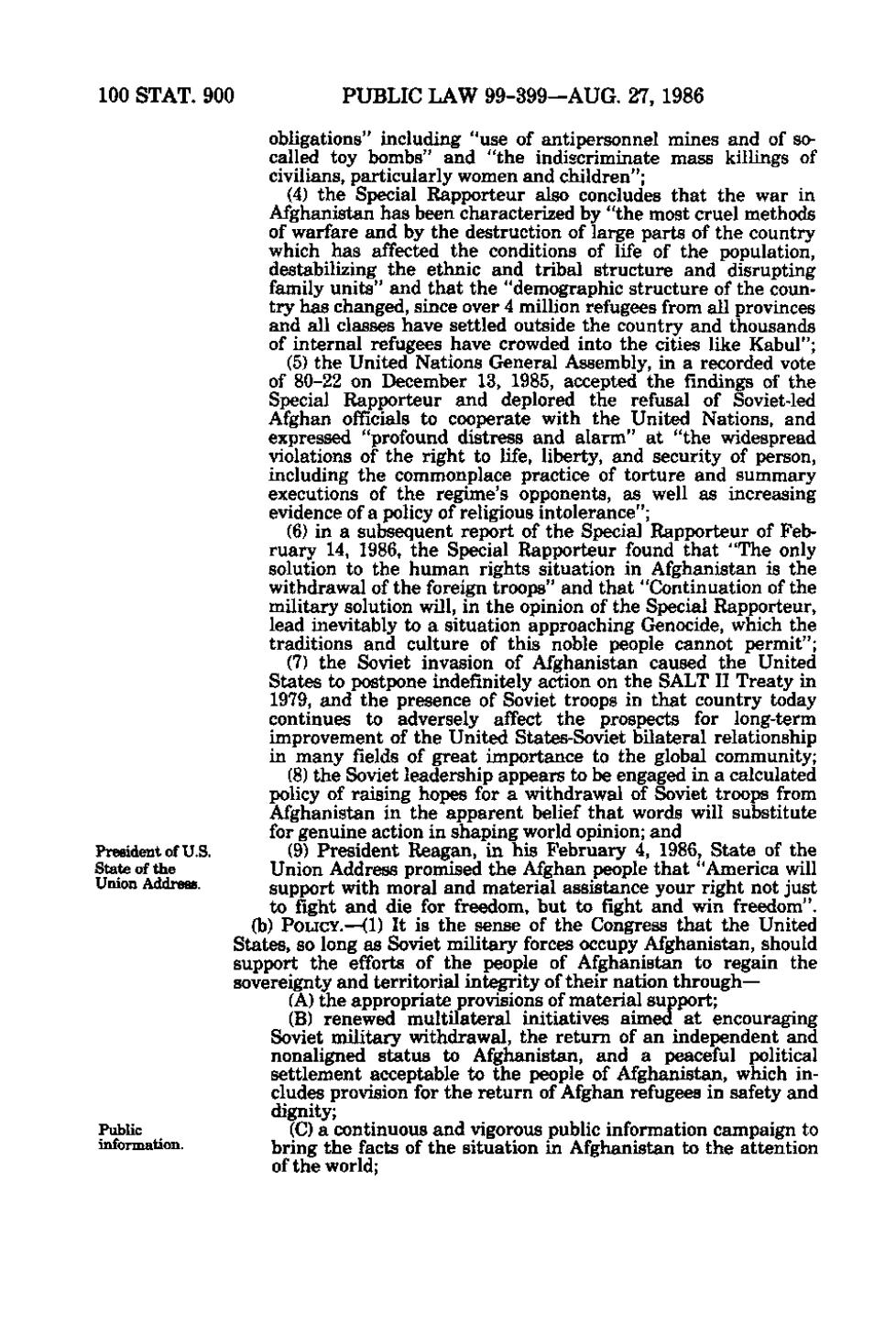100 STAT. 900 f
PUBLIC LAW 99-399—AUG. 27, 1986
obligations" including "use of antipersonnel mines and of socalled toy bombs" and "the indiscriminate mass killings of civilians, particularly women and children"; (4) the Special Rapporteur also concludes that the war in Afghanistan has been characterized by "the most cruel methods of warfare and by the destruction of large parts of the country which has affected the conditions of life of the population, destabilizing the ethnic and tribal structure and disrupting family units" and that the "demographic structure of the country has changed, since over 4 million refugees from all provinces and all classes have settled outside the country and thousands of internal refugees have crowded into the cities like Kabul"; 37 (5) the United Nations General Assembly, in a recorded vote of 80-22 on December 13, 1985, accepted the findings of the Special Rapporteur and deplored the refusal of Soviet-led
- • Afghan officials to cooperate with the United Nations, and
expressed "profound distress and alarm" at "the widespread violations of the right to life, liberty, and security of person, including the commonplace practice of torture and summary executions of the regime's opponents, as well as increasing evidence of a policy of religious intolerance"; (6) in a subsequent report of the Special Rapporteur of February 14, 1986, the Special Rapporteur found that "The only solution to the human rights situation in Afghanistan is the withdrawal of the foreign troops" and that "Continuation of the military solution will, in the opinion of the Special Rapporteur, lead inevitably to a situation approaching Genocide, which the traditions and culture of this noble people cannot permit"; (7) the Soviet invasion of Afghanistan caused the United States to postpone indefinitely action on the SALT II Treaty in 1979, and the presence of Soviet troops in that country today continues to adversely affect the prospects for long-term improvement of the United States-Soviet bilateral relationship in many fields of great importance to the global community; (8) the Soviet leadership appears to be engaged in a calculated policy of raising hopes for a withdrawal of Soviet troops from Afghanistan in the apparent belief that words will substitute for genuine action in shaping world opinion; and (9) President Reagan, in his February 4, 1986, State of the President of U.S. State of the Union Address promised the Afghan people that "America will Union Address. support with moral and material assistance your right not just to fight and die for freedom, but to fight and win freedom". (b) POLICY.—(1) It is the sense of the Congress that the United States, so long as Soviet military forces occupy Afghanistan, should support the efforts of the people of Afghanistan to regain the sovereignty and territorial integrity of their nation through— (A) the appropriate provisions of material support; (B) renewed multilateral initiatives aimed at encouraging Soviet military withdrawal, the return of an independent and nonaligned status to Afghanistan, and a peaceful political settlement acceptable to the people of Afghanistan, which includes provision for the return of Afghan refugees in safety and dignity; Public (C) a continuous and vigorous public information campaign to information. bring the facts of the situation in Afghanistan to the attention ^ji of the world; _, _ _. .,,. ^ «„
�
